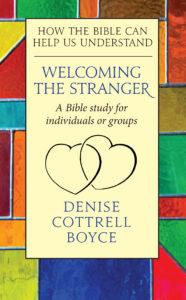Book: Welcoming the Stranger

With the UK Government's New Plan for Immigration threatening to criminalise some asylum seekers and even those who try to help them, this book could hardly be more timely. In the UK today, the welcoming of strangers is a highly contentious issue.
We might, however, expect a Bible study on the subject to be fairly predictable and potentially anodyne. Even the least religious person will probably have some idea that the Bible would instruct us to welcome strangers, just as it instructs us to feed the hungry, visit the sick, and generally be kind to anyone who is suffering or in need. But what makes this book far from predictable, and hence so valuable, is that it gives real attention and empathy to everyone involved in the migration and refugee crisis, both migrants and host communities - even those in host communities whom we may be quick to dismiss as racist or xenophobic.
In the first chapter, 'How Shall We Sing the Lord's Song in a Foreign Land?' the author empathises strongly with the desolation of people who have lost everything, and who find themselves in an alien environment with no control over their own lives. For the past 13 years Cottrell Boyce has volunteered in Liverpool with a charity for pre-and post-natal asylum-seekers, supporting and accompanying women through often traumatic situations, offering emotional and practical support. Her personal deep commitment to welcoming strangers is a very significant part of her own life.
But in the second chapter, 'Who Is Not My Neighbour?', Cottrell Boyce examines the undeniable reality that in many places and at many times, strangers and outsiders have been used to create a sense of community cohesion - the fear of the outsider can strengthen our sense of who we are. That way of thinking, of inclusion and exclusion, insiders and outsiders, is rendered obsolete by the gospels. She writes, "One piece of Good News that Jesus has for us is that we don't need to play that game anymore. There are no outsiders in the Kingdom of Heaven. In the Kingdom, no one has to be out for someone else to be in."
This does not however, mean a resort to platitudes and easy answers. In the next chapter, 'Fighting for the Scraps From the Table' the author highlights the fact that due to government policy and brutal economics, asylum seekers are usually dispersed to the poorest and most deprived communities in the UK, where housing is cheap, facilities are poor, and services are already stretched to their limits. So it is hardly surprising that whilst there are many examples of extraordinary generosity and hospitality, some in these communities may see new arrivals as just one more threat to their already stressful and precarious existence.
Cottrell Boyce is respectful about the fears these host communities may feel, the cultural clashes which may occur, and the sense of loss that can be felt when a long-established, familiar neighbourhood changes. Xenophobia, we are reminded, is not a hatred of foreigners, but a fear of them, and in some circumstances that fear can be understandable. With characteristic honesty she admits, "I cannot say for sure whether the concern I feel for the fate of asylum-seekers and migrants would be as uncomplicated if my well-being or my children's needs were compromised by their presence."
In the next chapter, 'Everything in Common', the author goes on to explore the fact that in reality the lives of asylum-seekers and their neighbours living in poverty have many similarities, and that addressing inequality is the answer - in effect, no justice, no peace.
As Cottrell Boyce writes: "We live in a society that habitually reduces complicated issues to binary choices. In its crudest terms our responses to migration, both personally and nationally, can boil down to, 'Good high-minded people welcome and cherish all incomers without question. Racist bigots reject, vilify and persecute them.'
"This isn't helpful nor is it an honest response to the gospel of love. The Sermon on the Mount invites us to think beyond our normal moral code to think the unthinkable and love the unlovable."
The Old Testament stories of exile, which include welcome and hostility, acceptance and suspicion, are employed to examine the complexity and ambiguity of our attitudes to the arrival of strangers in our communities. Cottrell Boyce is also honest enough to reveal the times when she herself has unthinkingly harboured stereotypes and preconceptions. Middle class people of her age tend to pride themselves on having left the racism of their parents' generation behind - but have no compunction in sneering at the stereotypical Sun reader, who may themselves be living very difficult lives.
The combination of Bible texts, anecdotes from the author's own life and Irish migrant heritage, and a variety of cultural references, make this a highly readable and engaging study. The prose is perfectly clear, there is a blessed absence of theological jargon, and the honesty with which the author at times reveals her own faults is admirable and refreshing. Readers may not agree with every point made, indeed they may strongly disagree at times, but this is what makes the book a genuine and meaningful contribution to the debate on these difficult issues.
In her conclusion, Cottrell Boyce quotes the John Donne poem, 'No man is an island'. With the climate crisis and the pandemic making our interconnectedness ever more apparent, it is clear that to create a harmonious society we must address not only the needs of asylum seekers and migrants, but the problems that cause them to leave their homes, and the concerns of the communities in which they settle. The UNHCR, in advocating for equitable distribution of Covid vaccines has said, 'No-one is safe until everyone is safe'. It is perhaps also true that migrants and asylum seekers will not really feel safe and secure until everyone in their host communities feel safe and secure.
As an individual reader I found this book a challenging, thought-provoking and occasionally surprising read, and used as the basis for a study group I think it would lead to lively, honest, and fruitful discussions. Its great strength it is that it could be used in communities where immigration is a controversial issue, and both host community and migrants would feel that their concerns were equally respected. It really is a book for our times.
Welcoming the Stranger, by Denise Cottrell Boyce is published by Darton, Longman and Todd. Price £7.99. It is available HERE
© Bernadette Meaden has written about political, religious and social issues for some years, and is strongly influenced by Christian Socialism, liberation theology and the Catholic Worker movement. She is an Ekklesia associate and regular contributor. Her latest book is Illness, Disability and Caring: A Bible study for individuals and groups (DLT, 2020). Her latest articles can be found HERE. You can follow Bernadette on Twitter: @BernaMeaden


















